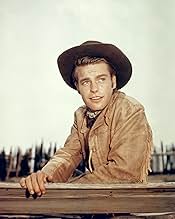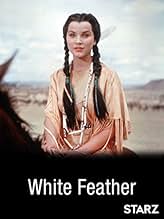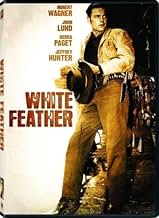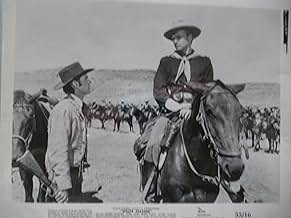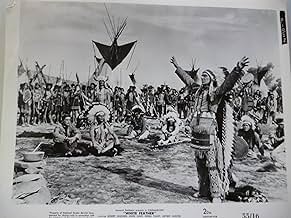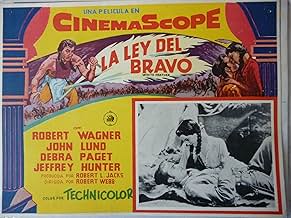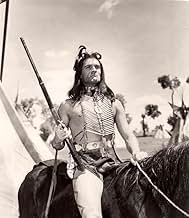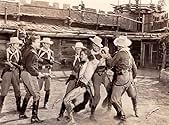IMDb रेटिंग
6.4/10
1.2 हज़ार
आपकी रेटिंग
अपनी भाषा में प्लॉट जोड़ेंIn 1877 Wyoming, during the peace negotiations between the Cheyenne and the USA, an Indian girl falls in love with a land surveyor, causing the ire of her Cheyenne fiance.In 1877 Wyoming, during the peace negotiations between the Cheyenne and the USA, an Indian girl falls in love with a land surveyor, causing the ire of her Cheyenne fiance.In 1877 Wyoming, during the peace negotiations between the Cheyenne and the USA, an Indian girl falls in love with a land surveyor, causing the ire of her Cheyenne fiance.
- निर्देशक
- लेखक
- स्टार
Noah Beery Jr.
- Lt. Ferguson
- (as Noah Beery)
Iron Eyes Cody
- Indian Chief
- (बिना क्रेडिट के)
फ़ीचर्ड समीक्षाएं
This is one of a number of 1950s Westerns which attempted to redress the balance by painting a fairly sympathetic view of the American Indian; even so, to spice up proceedings, we get a couple of rebels (second lead Jeffrey Hunter among them) opposing the impending peace treaty offered by the white man. Incidentally, though inspired by a factual incident, the film's plot line basically mingles elements from two contemporary examples of the genre BROKEN ARROW (1950; whose director, Delmer Daves, contributed to the script of this one) and ARROWHEAD (1953). With this in mind, the film doesn't really bring anything new to the table but, made with consummate Hollywood professionalism, the result is undeniably entertaining nonetheless.
Casting is adequate, too: apart from the afore-mentioned Hunter (though not exactly convincing as a redskin), we get Robert Wagner as an all-too-young Government agent hero who mediates between the two parties, Debra Paget (in a virtual reprise of her BROKEN ARROW role and who eventually defies her people by eloping with Wagner), John Lund as the experienced Cavalry officer in charge, Eduard Franz as Hunter's dignified chieftain father, Hugh O'Brian (as with Peter Graves in the same director's BENEATH THE 12-MILE REEF [1953], a viewing of which preceded this one, he's the heroine's brash but unloved intended), Virginia Leith as a more mature secondary love interest for Wagner, and Emile Meyer as her racist storekeeper father. By the way, I've just taped the first cinematic adaptation of Ira Levin's thrller A KISS BEFORE DYING (1956) off Cable TV which I noticed shares a remarkable number of cast and crew members with the title under review (not least its hunky stars)!
Being a largely outdoor film and in order to supply the appropriate grandeur, Lucien Ballard's widescreen photography is rather frustratingly limited to long or medium shots which, when screened on a normal-sized TV set, unfortunately leads to a certain detachment on the viewer's part; by the way, in the accompanying poster gallery on the DVD, the fact that patrons would be watching a "Cinemascope" production was deemed a bigger draw than even the stars involved! The film culminates with an unusual sort of showdown as Hunter and O'Brian face an entire cavalry unit (apparently an Indian battle custom which explains the film's title) however, the duo's come-uppance sees the personal intervention of Franz, who's not pleased with their 'brave' gesture; this is then followed by a lengthy (and, I'd even say, unwarranted) scene in which Wagner meticulously prepares Hunter for burial.
The Fox DVD includes quite a nice assortment of extras: these include a reproduction of the original pressbook (filled with amusingly irrelevant ballyhoo), a reasonably comprehensive photo gallery, and a number of trailers for the studio's other catalog entries in the genre (among them the desirable Victor Mature vehicle FURY AT FURNACE CREEK [1948] surprisingly narrated and carrying the personal endorsement of none other than Gregory Peck! and latterday black-and-white potboiler CONVICT STAGE [1965], which I'd never heard of myself and can't fathom why it was even deemed worthy of a DVD release).
Casting is adequate, too: apart from the afore-mentioned Hunter (though not exactly convincing as a redskin), we get Robert Wagner as an all-too-young Government agent hero who mediates between the two parties, Debra Paget (in a virtual reprise of her BROKEN ARROW role and who eventually defies her people by eloping with Wagner), John Lund as the experienced Cavalry officer in charge, Eduard Franz as Hunter's dignified chieftain father, Hugh O'Brian (as with Peter Graves in the same director's BENEATH THE 12-MILE REEF [1953], a viewing of which preceded this one, he's the heroine's brash but unloved intended), Virginia Leith as a more mature secondary love interest for Wagner, and Emile Meyer as her racist storekeeper father. By the way, I've just taped the first cinematic adaptation of Ira Levin's thrller A KISS BEFORE DYING (1956) off Cable TV which I noticed shares a remarkable number of cast and crew members with the title under review (not least its hunky stars)!
Being a largely outdoor film and in order to supply the appropriate grandeur, Lucien Ballard's widescreen photography is rather frustratingly limited to long or medium shots which, when screened on a normal-sized TV set, unfortunately leads to a certain detachment on the viewer's part; by the way, in the accompanying poster gallery on the DVD, the fact that patrons would be watching a "Cinemascope" production was deemed a bigger draw than even the stars involved! The film culminates with an unusual sort of showdown as Hunter and O'Brian face an entire cavalry unit (apparently an Indian battle custom which explains the film's title) however, the duo's come-uppance sees the personal intervention of Franz, who's not pleased with their 'brave' gesture; this is then followed by a lengthy (and, I'd even say, unwarranted) scene in which Wagner meticulously prepares Hunter for burial.
The Fox DVD includes quite a nice assortment of extras: these include a reproduction of the original pressbook (filled with amusingly irrelevant ballyhoo), a reasonably comprehensive photo gallery, and a number of trailers for the studio's other catalog entries in the genre (among them the desirable Victor Mature vehicle FURY AT FURNACE CREEK [1948] surprisingly narrated and carrying the personal endorsement of none other than Gregory Peck! and latterday black-and-white potboiler CONVICT STAGE [1965], which I'd never heard of myself and can't fathom why it was even deemed worthy of a DVD release).
Robert Wagner( Josh Tanner) was climbing up the ladder of success in this movie and gave an excellent performance along with Debra Paget(Appearing Day) and even Noah Berry, Jr.(Lt. Ferguson)(son of the famous Wallace Berry of the 1930's and 40's) The photography was fantastic and the plot was not just one of those typical Western films. In many ways, this picture made you feel very sorry for the Native Americas of this country who lost their wonderful land and Buffalo and had to locate South in very barren lands. Try to catch this movie on TV and you will definitely enjoy the youthful face of Robert Wagner along with great actors and a wonderfully made film of 1955!
White Feather is out of Panoramic Productions, it's directed by Robert D. Webb and stars Robert Wagner, Debra Paget, John Lund, Eduard Franz & Jeffrey Hunter. It's adapted from a John Prebble story by Delmer Daves & Leo Townsend. It was filmed in Durango, Mexico, with Lucien Ballard on cinematography duties (CinemaScope/Technicolor) and Hugo Friedhofer provides the score. Plot centres around the peace mission from the US cavalry to the Cheyenne Indians in Wyoming during the 1870s, but problems arose because a few of the Cheyenne refused to leave their hunting grounds.
One of the few 1950s Westerns to show sympathy towards the Indian plight, White Feather is a well intentioned and well executed movie. It suffers a little from familiarity with Broken Arrow (1950), where Delmer Daves had directed James Stewart and Debra Paget thru a similar script to the one that's now in front of Wagner and Paget; and lets face it-Wagner is no Jimmy Stewart- and Robert Webb is no Delmer Daves-but there's more than enough good here to lift it above many other liberal Westerns.
Away from the endearing and emotive story (and it is as the Cheyenne are forced out of Wyoming by the Federals), the film also boasts high points for the Western fan to gorge upon. It's gorgeously shot in CinemaScope by Ballard, a first class lens-man in the genre, and Friedhofer's score is pulsating, evocative and in tune with the tone of the tale. Also of note is that these Native Americans aren't caricatures or pantomime Indians. They may be being played by white actors (Hunter & Franz do especially good work), but they feel real and come out as the human beings they were. In fact the whole movie looks convincing.
There's some missteps along the way; such as Wagner over acting and having a voice that's sounds out of place in the Wild West, while the romantic angle (Paget is so beautiful here who could not fall in love with her?) does at times threaten to clog up the narrative. But these things don't hurt the film. On the flip side there's the smooth pacing of the piece, it's only when the tense and exciting climax has arrived that you realise how well the slow burn first half was handled. And Webb may well be a second unit director in all but name here, but his construction of the scenes with hundreds of extras is top notch work.
A fine and under seen Western that is based on actual events and doesn't over egg its pudding. 7/10
One of the few 1950s Westerns to show sympathy towards the Indian plight, White Feather is a well intentioned and well executed movie. It suffers a little from familiarity with Broken Arrow (1950), where Delmer Daves had directed James Stewart and Debra Paget thru a similar script to the one that's now in front of Wagner and Paget; and lets face it-Wagner is no Jimmy Stewart- and Robert Webb is no Delmer Daves-but there's more than enough good here to lift it above many other liberal Westerns.
Away from the endearing and emotive story (and it is as the Cheyenne are forced out of Wyoming by the Federals), the film also boasts high points for the Western fan to gorge upon. It's gorgeously shot in CinemaScope by Ballard, a first class lens-man in the genre, and Friedhofer's score is pulsating, evocative and in tune with the tone of the tale. Also of note is that these Native Americans aren't caricatures or pantomime Indians. They may be being played by white actors (Hunter & Franz do especially good work), but they feel real and come out as the human beings they were. In fact the whole movie looks convincing.
There's some missteps along the way; such as Wagner over acting and having a voice that's sounds out of place in the Wild West, while the romantic angle (Paget is so beautiful here who could not fall in love with her?) does at times threaten to clog up the narrative. But these things don't hurt the film. On the flip side there's the smooth pacing of the piece, it's only when the tense and exciting climax has arrived that you realise how well the slow burn first half was handled. And Webb may well be a second unit director in all but name here, but his construction of the scenes with hundreds of extras is top notch work.
A fine and under seen Western that is based on actual events and doesn't over egg its pudding. 7/10
White Feather is a combination of the plots of both Broken Arrow and Cheyenne Autumn. It's the story of a romance between Robert Wagner and Indian princess Debra Paget set against the background of the surrender of the Cheyenne nation to the white man.
Wagner is part of delegation sent to the Cheyenne chief Eduard Franz to negotiate a treaty with the Cheyenne. Although Franz's son Jeffrey Hunter is for no surrender at any price, he and Wagner become friends. Wagner becomes more than friends with Hunter's sister Paget, something that arouses the old jealous green eye in Hugh O'Brian, an Cheyenne warrior who figures Paget's his.
Paget's not going to find it easy in the white world in any case. The post sutler Emile Meyer's not liking Indians in any case and even though his daughter Virginia Leith becomes friends with Paget, she's got a thing for Wagner herself.
White Feather is a sympathetic portrayal of the Cheyenne in the last days of a proud warrior nation. Best in the cast is Jeffrey Hunter, the man who won't give in and most of all won't surrender his pride.
John Lund as the post commander and Milburn Stone the civilian treaty negotiator are in the cast as well. White Feather is a fine western that does not get near enough acclaim.
Wagner is part of delegation sent to the Cheyenne chief Eduard Franz to negotiate a treaty with the Cheyenne. Although Franz's son Jeffrey Hunter is for no surrender at any price, he and Wagner become friends. Wagner becomes more than friends with Hunter's sister Paget, something that arouses the old jealous green eye in Hugh O'Brian, an Cheyenne warrior who figures Paget's his.
Paget's not going to find it easy in the white world in any case. The post sutler Emile Meyer's not liking Indians in any case and even though his daughter Virginia Leith becomes friends with Paget, she's got a thing for Wagner herself.
White Feather is a sympathetic portrayal of the Cheyenne in the last days of a proud warrior nation. Best in the cast is Jeffrey Hunter, the man who won't give in and most of all won't surrender his pride.
John Lund as the post commander and Milburn Stone the civilian treaty negotiator are in the cast as well. White Feather is a fine western that does not get near enough acclaim.
Good Western , considered one of the first Hollywood films to side with the Indians . 1887 Wyoming , this is the story of a complex peace carried out by the Natives : Sioux , Arapahoes , BlackFoot and the US government . But a tribe resists the complete pacification : The Cheyenne . As a twisted and troublesome relationship takes place between the American cavalry commanded by Col. Lindsay from Fort Laramie : John Lund and the Cheyenne Indians led by Broken Hand ; while crooks settlers and mean traders thwart peace . A civilian surveyor : Robert Wagner attempts to make up , as he sets out to find true peace among feuding White men and Indians . Later on , he befriends a Cheyenne chief , Broken Hand: Eduard Franz , and his son Little Dog : Jeffrey Hunter and subsequently falls for his daughter Appearing Day : Debra Paget. But things go wrong when appears the jealous suitor : Hugh O'Brian, causing a merciless vengeance.The fate of the West lay in their hands , beyond any Indian adventure ever filmed , for this was the hour of decision and the last and deadly period of the Indian wars .
The picture is acclaimed along with "Broken Arrow" like the first to deal the Indian people with justice and understanding .The movie set during the 1870s is plenty of emotion , drama , romance , go riding , fights , and spectacular outdoors . The film contains enjoyable depiction about Indian habits as it was actually .A young Robert Wagner gives an acceptable acting as a surveyor whose mission is threatened when falls for the chief's daughter. She is played by the gorgeous Debra Paget interpretating a similar role to Broken Arrow. Both of whom are supported by Jeffrey Hunter who played along with Robert Wagner in "The true story of Jesse James" and "A Kiss before Dying .Furthermore , an agreeable support cast , such as : Eduard Franz as Indian chief , Hugh O'Brian as the angry fiance whose ire causes a relentless revenge , Noah Beery Jr as Lt. Ferguson , Emile Meyer , Milburn Stone and Iron Eyes Cody who played a number of Indian roles ; however , being Italian origin . Evocative and imaginative musical score by Hugo Friedhofer who also composed Broken arrow. It displays a colorful and evocative cinematography by Lucien Ballard , Peckinpah's ordinary cameraman, being shot on location in Fort Laramie , Wyoming , actual Fort at centre of events and activities portrayed and in Durango , Mexico .
The motion picture was well directed by by Robert D Webb. He was a fine craftsman and expert professional who produced and directed all kinds of genres as Cinema as TV episodes. He began working as an assistant director and second unit director in titles as Ramona, Lloyd of London , Seventh heaven , Maryland or Just around the corner. Being his his film debut :The Caribbean mystery ; from now on , he made several cinematic genres . As he realized Westerns such as : The proud ones , The Jackals ; Adventures: Pirates of Tortuga , Seven cites of gold , The way to the gold ; Film Noir : The Cape town affair , The Spiders , The Caribbean mystery ; Warlike : The glory brigade , 7 Women from hell ; and Sci-Fi : On the three hold of space . Although he also made some documentary , shorts, and Telefilms and TV episodes , such as: Temple Houston , Daniel Boone . Rating : 7 .Enjoyable Indian fare that will appeal to Western fans .
The picture is acclaimed along with "Broken Arrow" like the first to deal the Indian people with justice and understanding .The movie set during the 1870s is plenty of emotion , drama , romance , go riding , fights , and spectacular outdoors . The film contains enjoyable depiction about Indian habits as it was actually .A young Robert Wagner gives an acceptable acting as a surveyor whose mission is threatened when falls for the chief's daughter. She is played by the gorgeous Debra Paget interpretating a similar role to Broken Arrow. Both of whom are supported by Jeffrey Hunter who played along with Robert Wagner in "The true story of Jesse James" and "A Kiss before Dying .Furthermore , an agreeable support cast , such as : Eduard Franz as Indian chief , Hugh O'Brian as the angry fiance whose ire causes a relentless revenge , Noah Beery Jr as Lt. Ferguson , Emile Meyer , Milburn Stone and Iron Eyes Cody who played a number of Indian roles ; however , being Italian origin . Evocative and imaginative musical score by Hugo Friedhofer who also composed Broken arrow. It displays a colorful and evocative cinematography by Lucien Ballard , Peckinpah's ordinary cameraman, being shot on location in Fort Laramie , Wyoming , actual Fort at centre of events and activities portrayed and in Durango , Mexico .
The motion picture was well directed by by Robert D Webb. He was a fine craftsman and expert professional who produced and directed all kinds of genres as Cinema as TV episodes. He began working as an assistant director and second unit director in titles as Ramona, Lloyd of London , Seventh heaven , Maryland or Just around the corner. Being his his film debut :The Caribbean mystery ; from now on , he made several cinematic genres . As he realized Westerns such as : The proud ones , The Jackals ; Adventures: Pirates of Tortuga , Seven cites of gold , The way to the gold ; Film Noir : The Cape town affair , The Spiders , The Caribbean mystery ; Warlike : The glory brigade , 7 Women from hell ; and Sci-Fi : On the three hold of space . Although he also made some documentary , shorts, and Telefilms and TV episodes , such as: Temple Houston , Daniel Boone . Rating : 7 .Enjoyable Indian fare that will appeal to Western fans .
क्या आपको पता है
- ट्रिवियाFirst American movie filmed (in 1954) in Durango, Mexico, because art director Jack Martin Smith liked the soundstages in the city and found the surrounding landscapes to be just what he was looking for.
- गूफ़The Army, at no time during the Indian Wars, used Winchester repeating lever action rifles, as shown.
- भाव
Josh Tanner: Eveything you will see in this movie actually happened, with the exception being the Indians' language. For the purposes of this story, they will speak English so that you can understand them.
टॉप पसंद
रेटिंग देने के लिए साइन-इन करें और वैयक्तिकृत सुझावों के लिए वॉचलिस्ट करें
- How long is White Feather?Alexa द्वारा संचालित
विवरण
- रिलीज़ की तारीख़
- कंट्री ऑफ़ ओरिजिन
- भाषा
- इस रूप में भी जाना जाता है
- The Challenge
- फ़िल्माने की जगहें
- Fort Laramie National Historic Site - 965 Gray Rocks Road, Fort Laramie, Wyoming, संयुक्त राज्य अमेरिका(actual Fort at center of events and activities portrayed)
- उत्पादन कंपनी
- IMDbPro पर और कंपनी क्रेडिट देखें
बॉक्स ऑफ़िस
- बजट
- $11,25,000(अनुमानित)
- चलने की अवधि1 घंटा 42 मिनट
- पक्ष अनुपात
- 2.55 : 1
इस पेज में योगदान दें
किसी बदलाव का सुझाव दें या अनुपलब्ध कॉन्टेंट जोड़ें


